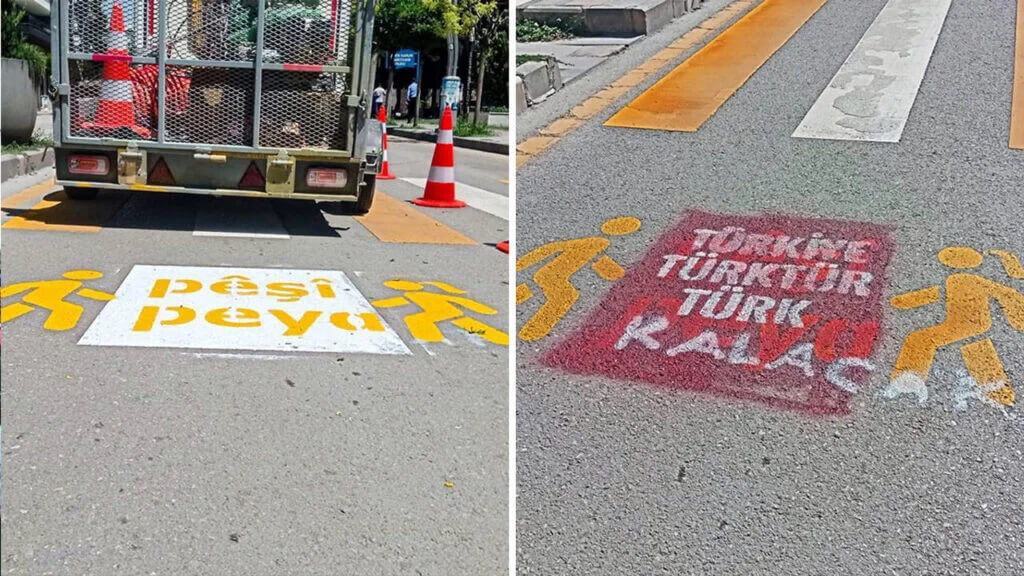Fifteen bar associations from Turkey’s Kurdish-majority regions have issued a joint statement condemning the defacing of Kurdish traffic signs, allegedly under the supervision of Turkish government officials.
An incident that took place late Tuesday night is said to have involved police accompanying workers from Turkey’s General Directorate of Highways (KGM) as they reportedly vandalized the signs.
The development followed a recent controversy where unidentified people had defaced Kurdish-language traffic signs in Turkey’s eastern provinces, in what appears to be a racially motivated attack on the minority language.
In Van on Friday, unknown individuals painted over Kurdish pedestrian crossing warnings, which originally read “Pêşî Peya (Pedestrians First),” replacing them with the nationalist slogan “Turkey is for Turks and will remain Turkish.”
The bar associations from Turkey’s eastern and southeastern provinces of Adıyaman, Ağrı, Batman, Bingöl, Bitlis, Tunceli, Diyarbakır, Hakkari, Kars, Mardin, Muş, Siirt, Şanlıurfa, Şırnak and Van collectively condemned the defacing of Kurdish language signs in several cities including Diyarbakır, Van, Mardin and Batman. In their statement, they called for an end to these practices and demanded thorough judicial and administrative investigations into the responsible individuals.
“Recently, it has been observed that traffic warnings in Kurdish on pedestrian crossings in Diyarbakır, Van, Mardin, and Batman are being defaced by civilians under police supervision or by KGM personnel,” the statement read. “Traffic rules are designed to ensure order and safety on roads, and there is no legal barrier to writing traffic signs in languages other than Turkish. Having traffic signs in the native language of a city’s residents does not undermine the regulation’s purpose; rather, it enhances traffic safety.”
The bar associations emphasized that the defacing of Kurdish signs reflects an intolerance towards the Kurdish language and its speakers, further stating that this attitude harms the culture of coexistence and social peace in Turkey. They urged the government to cease such actions immediately and to conduct effective investigations into those responsible.
In a related development, Orhan Miroğlu, a member of the Central Executive Board of the ruling Justice and Development Party (AKP), also criticized the defacing of Kurdish traffic signs and a recent wave of arrests for dancing to Kurdish music. Miroğlu questioned the rationale behind these actions, highlighting that they serve no real purpose and only deepen divisions within society.
“These are simple traffic warnings. In cities where most people speak Kurdish daily, having a few Kurdish traffic signs does not harm anyone. This irrational fear of the Kurdish language is incomprehensible,” Miroğlu said in a social media post.
The Turkish state has in the past severely restricted the use of the Kurdish language and strictly denied it official recognition, including at the local and provincial levels, despite the fact that it is the language of the country’s largest minority.
The visibility of Kurdish on TV and in the print media was only made possible in the early 2000s thanks to significant progress made in the country’s bid to become a member of the EU.
Yet, the drift towards nationalism and the ruling AKP alliance with the far-right Nationalist Movement Party (MHP) in the last decade has led to an increase in anti-Kurdish racist attacks.

